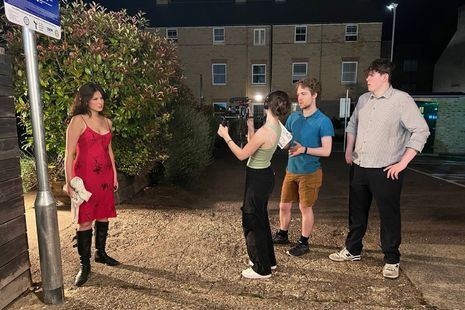Finding space in Cambridge for the love of filmmaking
Otto Bajwa-Greenwood interviews the team behind student-led film production society Silver Street Productions

Cambridge has become a nationally recognised incubator of dramatic talent, but it was really from the 1970s onwards that the reputation of Cambridge’s theatre scene blossomed into a national tour de force. With world-renowned alumni such as Emma Thompson, Stephen Fry, Olivia Coleman, and Sacha Baron Cohen, theatre is arguably the most public and visible of the University’s arts. However, while all of these figures started off working across Cambridge’s dramatic societies, it is their contributions to film that has helped to elevate them to legendary status.
It therefore seems strange that there has not been more investment into the filmic ambitions of young people across the university, especially since the number of film schools and students taking academic interest in film has ballooned. However, despite Cambridge’s slow response, students have taken their own initiative. Silver Street Productions, an amateur film production society in Queens’ College, is one amazing example of when a student body has directed this charge. Headed by President Millie Hine (2nd Year, English), with support from Artistic Producer Aidan Collins (3rd Year, English) and Technical Director Finlay Wyer (3rd Year Engineering), the group are helping to nurture and bring student-led film proposals to light. Interviewing Silver Street Productions, I attempted to find out more about their previous projects, the difficulties of student film making, and exciting opportunities for the future.
Having seen her work premiere in both Times Square (The Snake and the Apple, 2022) and Leicester Square (Firecracker, 2024), Millie was in a perfect position to found a film society when she came to university. Her impetus for the society was twofold. She noted how continuing the practice of shooting and editing was “important for [her] personally,” to continue her own ambitions. Secondly, Millie wanted to dispel some of the assumptions about film to create a supportive environment: producing movies in the modern world can “seem quite intimidating … especially to those who have never participated before”. But in a university that is already well renowned for creative output, Millie also pointed out, “there is no reason why theatre should feel ‘more natural’ or attract involvement when film shouldn’t”.
“There is no reason why theatre should feel ‘more natural’ or attract involvement when film shouldn’t”
Millie even said that she used Cambridge’s theatrical prestige to her own advantage. The initial filming projects of the group were focused on filming trailers for theatrical productions, helping to “launch Silver Street off the ground” and attract support from thespians hoping to expand into other fields.
So far, the group has produced two short films, The Hotel Bed and What’s My Name. The former, which is a truncated segment taken from a script by Jay Palombella, revolves around a central conflict between a groom-to-be and his childhood best friend. As recapped to me by the creators, The Hotel Bed is ostensibly about “characters being trapped within their own decision making”.
The latter, written by Millie Hine herself after a “conversation in Wetherspoons that resonated with me,” follows a date between two characters who share an interest in cars. However, all is not as it turns out to be, as one character appears to know much more than she initially lets on. When asked about the uncomfortable shock factor that links the films, Millie jovially replied that the way the films occasionally “take you off guard” might be “reflective of the Cambridge experience,” where you are likely to meet a “lot of dark horses”.
However, expectedly, running an amateur film production society does bring various difficulties. At a university famous for its high-intensity workload, the Silver Street team emphasised the importance of being efficient with their time. Being frank about the commitment, Finlay noted that it is “not going to consume weeks of your life,” but it will likely dominate most of it for “the two days of shooting”. While this may seem like a lot, the small, tight-knit group stressed that they were willing to put in such hours for the “joy of making film” rather than mere “obligation”.
Millie and Finlay spoke about the practical difficulties of filming with low costs, without formal training and limited equipment. The pair noted that there was a lot of “self-teaching” and “learning on the job” especially at the start. But the group underscored that “anyone can get involved,” and that expanding newcomers’ skillsets, as well as refining their own, reminds them of the importance of their endeavour in the first place. Surmising these potential obstacles, Millie said, “you know you don’t have the biggest budget in the world and it might go wrong but that’s okay, it’s part of learning – just don’t break the camera!”
“Expanding newcomers’ skillsets, as well as refining their own, reminds them of the importance of their endeavour in the first place”
The crew were also free to discuss the support they had received from the university. Mille recounted how she pitched a document to Andrew Zurcher (Director of Studies for English at Queens) at the start of last year, outlining her intention for the society, and that he was “very receptive and supportive of my ambition and initiative”. Millie was quick to add that without that mindset, along with the help from all the other staff at Queens (specifically Richard De Cordova, AV Theatre technical manager) and funding for equipment, “we would not have got as far as we have”.
The team of Silver Street Productions were keen to assert their ambitions for the future. They hinted at an upcoming screening of The Only Fruit, written by Madeline Whitmore, which is currently in production and set for release later this year. Both Millie and Finlay expressed their excitement for this new project, describing it as the moment when audiences will see “Silver Street at its full force”. The society claims that they are using their equipment to its greatest potential yet, creating a film that is “bigger in scope,” “longer,” and marked by greater “variety” than anything they have attempted before. Finlay, whose focus is more on the (often-overlooked) technical side of filmmaking, appeared particularly enthusiastic about the new film, seeing it as a great opportunity to inform people about the “technical side of telling stories,” and hoping to attract more “technical minds” to the arts.
Millie stated that the overall goal would be to create a lasting legacy of film production across the university. She would like for “Silver Street to become [that] model,” hoping that the creative-centred ethos of Silver Street would inspire students for generations to come. Millie ended the interview looking optimistically towards the future, declaring, “ultimately, I want people to come and watch, and then leave thinking not only ‘I could do that too’, but ‘I could do that even better’; if you can, please join me or drop me an email telling me how to improve.”
The Hotel Bed and What’s My Name are set to premiere at the Fitzpatrick Hall in Queens’ College at 7:30pm on the 30th October.
 News / Judge Business School advisor resigns over Epstein and Andrew links18 February 2026
News / Judge Business School advisor resigns over Epstein and Andrew links18 February 2026 News / Gov grants £36m to Cambridge supercomputer17 February 2026
News / Gov grants £36m to Cambridge supercomputer17 February 2026 News / Union speakers condemn ‘hateful’ Katie Hopkins speech14 February 2026
News / Union speakers condemn ‘hateful’ Katie Hopkins speech14 February 2026 News / CUCA members attend Reform rally in London20 February 2026
News / CUCA members attend Reform rally in London20 February 2026 News / Right-wing billionaire Peter Thiel gives ‘antichrist’ lecture in Cambridge6 February 2026
News / Right-wing billionaire Peter Thiel gives ‘antichrist’ lecture in Cambridge6 February 2026










